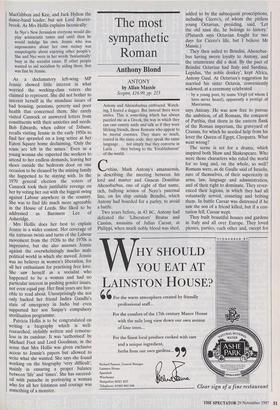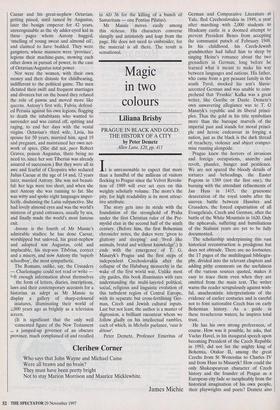The most sympathetic Roman
Anthony Blond
ANTONY by Allan Massie Sceptre, £16.99, pp. 213
Antony and Ahenobarbus embraced. Watch- ing, I feared a dagger. But instead there were smiles. This is something which has always puzzled me as a Greek, the way in which they can cast enmity aside and talk as if they were lifelong friends, those Romans who appear to be mortal enemies. They share so much, reared in the same code, they speak the same language ... not simply that they converse in Latin . . . they belong to the 'Establishment' of the world.
Critias, Mark Antony's amanuensis, is describing the meeting between his lord and master and Gnaeus Domitius Ahenobarbus, one of eight of that name, rich, bullying aristos of Nero's paternal line, on his ship outside Brindisi, which Antony had boarded for a parley, to avoid a battle.
Two years before, in 43 BC, Antony had defeated the 'Liberators' Brutus and Cassius, assassins of Julius Caesar, at Philippi. when much noble blood was shed, added to by the subsequent proscriptions, including Cicero's, of whom the pitiless young Octavian, presiding, said, 'Let the old man die, he belongs to history.' (Plutarch says Octavian fought for two days for Cicero's life, but I believe Mr Massie.) They then sailed to Brindisi, Ahenobar- bus having sworn loyalty to Antony, and the triumvirate did a deal. By the pact of Brindisi Octavian had Italy and Sardinia, Lepidus, 'the noble donkey', kept Africa, Antony Gaul. At Octavian's suggestion he married his sister Octavia, conveniently widowed, at a ceremony celebrated
by a young poet, by name Virgil (of whom I have never heard), apparently a protégé of Maecaenas,
says Antony. He was now free to pursue the ambition, of all Romans, the conquest of Parthia, that thorn in the eastern flank of the Roman imperium, the graveyard of Crassus, for which he needed help from his lover the Queen of Egypt, Cleopatra. What went wrong?
The scene is set for a drama, which inspired both Shaw and Shakespeare. Who were those characters who ruled the world for so long and, on the whole, so well? Romans were, as de Gaulle said of Israelis, sure of themselves, of their superiority ,in arms, law, language and administration, and of their right to dominate. They rever- enced their legions, in which they had all voluntarily served, cosseting and bribing them. In battle Caesar was distressed if he saw the son of a friend killed, but if a cen- turion fell, Caesar wept.
They built beautiful houses and gardens in Italy and all over Europe. They loved picnics, parties, each other and, except for Caesar and his great-nephew Octavian, getting pissed, until tamed by Augustus, later the benign emperor for 42 years, unrecognisable as the sly adder-eyed kid in these pages whom Antony hugged, `smelling of young sweat and almond oil', and claimed to have bedded. They were gangsters, whose manners were 'province', legions their machine-guns, mowing each other down in pursuit of power, in the case of Octavian/Augustus total power.
Nor were the women, with their own money and their distaste for childbearing, indifferent to the political game. The men dictated their swift and frequent marriages and divorces but on the board they refused the role of pawns and moved more like queens. Antony's first wife, Fulvia, defend- ed Perusia against his own legions, flogging to death the inhabitants who wanted to surrender and was carted off, spitting and raging, to end her days with the vestal virgins. Octavian's third wife, Livia, his spouse for 50 years, married him, aged 19 and pregnant, and maintained her own net- work of spies. (She did not, pace Robert Graves, poison Augustus, there being no need to, since her son Tiberius was already assured of succession.) But they were all in awe and fearful of Cleopatra who seduced Julius Caesar at the age of 14 and, 12 years later, married Antony. She was not beauti- ful: her legs were too short, and when she met Antony she was running to fat. She was witty and spoke eight languages imper- fectly, disdaining the Latin subjunctive. She had lovely almond eyes and was the world's mistress of grand entrances, usually by sea, and finally made the world's most famous exit.
Antony is the fourth of Mr Massie's admirable studies; he has done Caesar, worshipped but unloved, his great-nephew and adopted son Augustus, cold and implacable, his step-son TiMrius, correct and a misery, and now Antony the 'superb schoolboy', the most sympathetic.
The Romans, unlike, say, the Crusaders — Charlemagne could not read or write 'eft enough information about themselves the form of letters, diaries, inscriptions, laws and their contemporary accounts for a historian as adept as Mr Massie to display a gallery of sharp-coloured iniatures, illuminating their world of 2,000 years ago as brightly as a television screen.
(It is significant that the only well • "cumented figure of the New Testament a jumped-up governor of an obscure province, much complained of and recalled in AD 36 for the killing of a bunch of Samaritans — one Pontius Pilatus).
Mr Massie moves easily among this richesse. His characters converse slangily and intimately and leap from the page. He does not need to embroider, for the material is all there. The result is sensational.



















































































 Previous page
Previous page